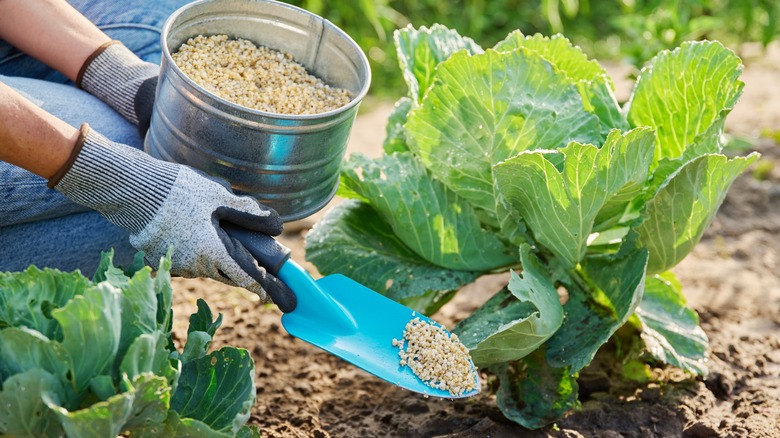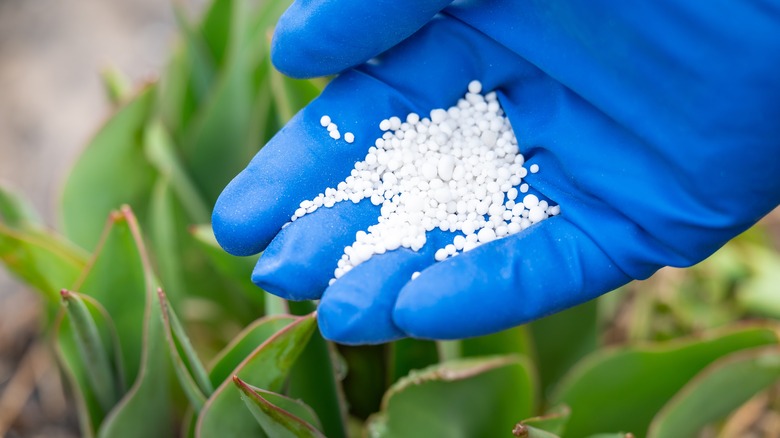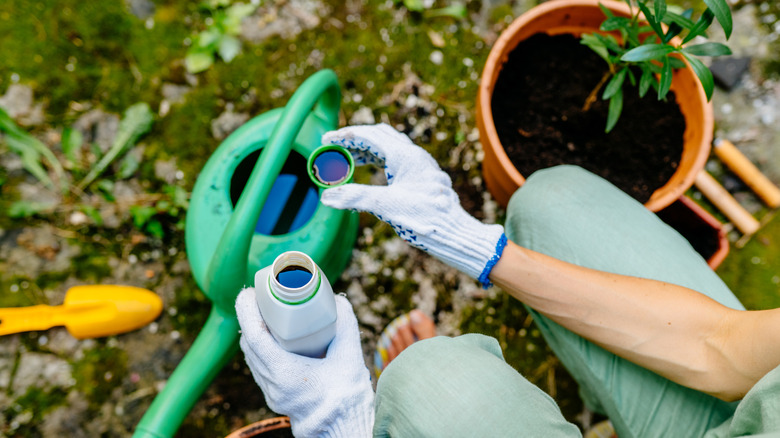How Long Does Fertilizer Really Last? (And Signs It's Time To Toss It)
Whether you're on a quest to maintain a lush, vibrant lawn or a garden full of thriving plants, you likely rely on fertilizer to get the job done. But if you've found a bag tucked away in the corner of your shed that you can't remember when you bought, you may be wondering whether it's still any good. Fortunately, the truth is that while fertilizer can go bad, most varieties last for at least a year — and some are even effective indefinitely, as long as they're stored properly.
Containing vital nutrients like nitrogen, phosphorus, and potassium, fertilizer helps encourage healthy growth for your plants, including flowers, trees, and grass. It is available in several formulas that you can choose from, such as granular, liquid, and organic fertilizers. Deciding which fertilizer is best for your needs can be tricky, but no matter which type you select, you'll want to understand its shelf life and how to recognize when it's no longer effective to ensure your plants and lawn get the nutrients they need.
The shelf life for each type of fertilizer
Granular fertilizer, liquid fertilizer, and organic fertilizer (also known as compost) each have a different shelf life, though all varieties are typically good for a year or more. For most homeowners, granular fertilizer is the preferred option because it offers the longest shelf life. It is made up of small pellets that, after application, slowly break down and deliver their nutrients to the plants. Moisture is the only potential issue, but if you store it in a cool, dry, and dark location, granular fertilizer can last indefinitely.
Liquid fertilizer absorbs into the soil more easily than granular fertilizer, so it usually provides faster results. However, its shelf life isn't as long. Most liquid fertilizers are effective for eight to 10 years, but you should always check the package for an expiration date. They deteriorate more quickly when unsealed, so keeping the container closed will extend its shelf life.
Keep in mind that synthetic granular and liquid fertilizers that contain pesticides or herbicides go bad more quickly than standard formulas. The active ingredients that provide weed and pest control become less effective over time, so these fertilizers have a shelf life of one to four years.
Compost and other organic garden and lawn fertilizers have shorter shelf lives than synthetic formulas. However, compost doesn't necessarily go bad as much as its nutritional content loses its potency. In most cases, it is effective for one to two years. Compost typically breaks down faster in hot, humid conditions, so keeping it cool and dry can help it stay effective.
How to tell if your fertilizer has gone bad
There are several mistakes you can make when fertilizing your garden, but using old fertilizer is one of the easiest to avoid. While most fertilizers can last for years, the formulas can lose their effectiveness if not stored properly. In many cases, exposure to moisture, humidity, air, and sunlight can cause fertilizer to spoil. That's why it's essential to recognize the signs that your fertilizer has gone bad. Despite its indefinite shelf life, granular fertilizer can lose its effectiveness if exposed to moisture. You can usually tell if it's gone bad if it forms hard clumps. If it's only recently been exposed to moisture, the clumps may be softer. In both cases, the fertilizer is more difficult to spread evenly, which is another warning sign that you should toss it.
Liquid fertilizer may separate when it goes bad. If you see sediment at the bottom of the container or observe distinct layers, it may no longer be effective. Additionally, a liquid formula's odor or consistency may change when it goes bad. The container can also start to bulge if gas-producing mold or bacteria have grown inside.
Compost and organic fertilizers typically have an earthy scent, so if you notice a foul odor, it has likely gone bad. Visible mold is another warning sign that it's time to throw away your compost and start over with a fresh batch.


